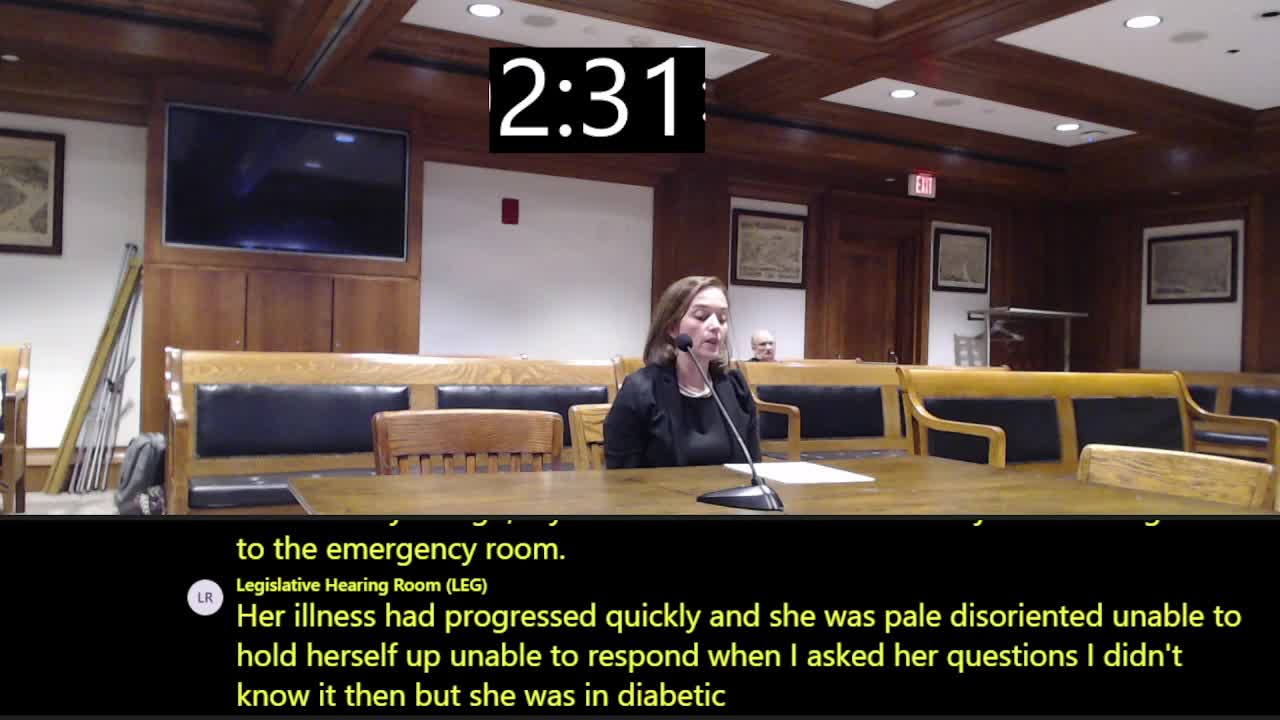Parents, Patients Urge Committee to Pass Emergency Insulin Access Bills H1212, H1240
October 01, 2025 | 2025 Legislature MA, Massachusetts
This article was created by AI summarizing key points discussed. AI makes mistakes, so for full details and context, please refer to the video of the full meeting. Please report any errors so we can fix them. Report an error »

Chair Shane Murphy and Co‑Chair Senator Feeney heard more than a half dozen personal accounts Monday urging the Joint Committee on Financial Services to approve bills that would allow pharmacists to dispense insulin in emergencies (H1212 and H1240).
Witnesses said insulin is life‑sustaining for people with type 1 diabetes and that delays in access can rapidly lead to diabetic ketoacidosis and death. “For people like me, insulin is not optional. It's life support,” said Jessica Bongolar of Arlington, who said she spent four days in an ICU after running out of insulin as a teenager. “No one with diabetes in Massachusetts should ever die because their doctor wasn't reachable or their insurer stood in the way,” she told the committee.
The bill proponents described scenarios in which prescriptions expire, prior authorizations are delayed, shipments spoil, or the only available supply is in another city — and said those situations require timely access at retail pharmacies. “If even one person avoids going into diabetic ketoacidosis because a pharmacist could step in, then this bill will have done its job,” said Megan Rarnell, who described rushing her 12‑year‑old daughter to the emergency room in diabetic ketoacidosis when the family could not obtain insulin.
Supporters referenced laws in other states and urged Massachusetts to adopt a similar emergency dispensing allowance. Laura Ritchie, who testified for both H1240 and H1212, noted that a version of the emergency‑dispensing law—sometimes called “Kevin’s Law” in other states—has been enacted in roughly a dozen states, and she asked the committee to consider how colleagues in Ohio implemented the change.
Committee members asked clarifying questions about the bills’ scope. Chair Feeney confirmed with witnesses that the measures under consideration were limited to emergency dispensing authority for pharmacists and did not address insurance coverage or price. “This is just an emergency dispensing measure, not cost or coverage,” Feeney said while reviewing the draft language.
Why it matters: witnesses said timely access to insulin can prevent hospitalizations and deaths and reduce overall health care costs that result from emergency care. They described gaps that occur despite good planning and existing supports, and they urged the committee to remove barriers that leave patients without a last‑line option when physicians or insurers are not immediately available.
The hearing included no vote on the bills; committee members closed the hearing at the end of the session.
Looking ahead: proponents urged the committee to move H1212 and H1240 out of committee and asked staff for opportunities to provide additional information on how other states implemented emergency dispensing without undermining broader insurance reforms.
Witnesses said insulin is life‑sustaining for people with type 1 diabetes and that delays in access can rapidly lead to diabetic ketoacidosis and death. “For people like me, insulin is not optional. It's life support,” said Jessica Bongolar of Arlington, who said she spent four days in an ICU after running out of insulin as a teenager. “No one with diabetes in Massachusetts should ever die because their doctor wasn't reachable or their insurer stood in the way,” she told the committee.
The bill proponents described scenarios in which prescriptions expire, prior authorizations are delayed, shipments spoil, or the only available supply is in another city — and said those situations require timely access at retail pharmacies. “If even one person avoids going into diabetic ketoacidosis because a pharmacist could step in, then this bill will have done its job,” said Megan Rarnell, who described rushing her 12‑year‑old daughter to the emergency room in diabetic ketoacidosis when the family could not obtain insulin.
Supporters referenced laws in other states and urged Massachusetts to adopt a similar emergency dispensing allowance. Laura Ritchie, who testified for both H1240 and H1212, noted that a version of the emergency‑dispensing law—sometimes called “Kevin’s Law” in other states—has been enacted in roughly a dozen states, and she asked the committee to consider how colleagues in Ohio implemented the change.
Committee members asked clarifying questions about the bills’ scope. Chair Feeney confirmed with witnesses that the measures under consideration were limited to emergency dispensing authority for pharmacists and did not address insurance coverage or price. “This is just an emergency dispensing measure, not cost or coverage,” Feeney said while reviewing the draft language.
Why it matters: witnesses said timely access to insulin can prevent hospitalizations and deaths and reduce overall health care costs that result from emergency care. They described gaps that occur despite good planning and existing supports, and they urged the committee to remove barriers that leave patients without a last‑line option when physicians or insurers are not immediately available.
The hearing included no vote on the bills; committee members closed the hearing at the end of the session.
Looking ahead: proponents urged the committee to move H1212 and H1240 out of committee and asked staff for opportunities to provide additional information on how other states implemented emergency dispensing without undermining broader insurance reforms.
View full meeting
This article is based on a recent meeting—watch the full video and explore the complete transcript for deeper insights into the discussion.
View full meeting
